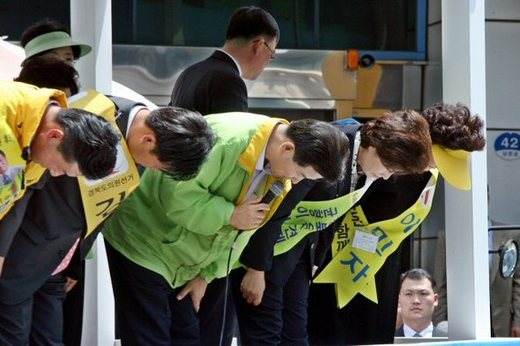Posted on : May.30,2006 10:19 KST
Modified on : May.30,2006 13:43 KST
The state of the Uri Party is quite unsightly these days. Its campaign strategy for this week’s regional elections, at this point, has become one of tears, in which it begs the public to at least prevent the main opposition party from making a clean sweep of all the seats available. This sort of sentiment is ruining the strong "face" Uri is naturally supposed to retain as the ruling party. Now there is talk about a merger of the Uri Party with the Democratic Party, itself something completely out of the blue, all the more so because Uri does not yet know exactly how it will perform in the elections. The discussion itself, however, is causing serious internal strife.
Several days ago, party chairman Chung Dong-young started talking about a restructuring of Korean politics, saying he was "leaving open all possibilities, including a merger with the Democratic Party." Party supreme council member and gubernatorial candidate for South Gyeongsang province Kim Doo-kwan responded by saying such suggestions were "a step backward, part of a bygone history that must be overcome." He openly called for Chung to leave the party.
It is up to Uri to determine whether such infighting will help it win votes or not, but such confusion in a ruling party that has always said it will last 100 years only makes the country feel uneasy. The situation has to be serious, indeed, for the main opposition GNP to issue a statement saying it is "sad and pathetic to see the ruling party so seriously in conflict with itself that you wonder if it still exists."
Any real democratic political party should expend every effort until the very end, when the votes are counted, however bad the results are expected to be. It is unsupportive of democracy for party members to be grabbing at each other’s throats and blaming each other for what looks like an election defeat. The behavior of Uri’s leadership right now is like someone who gives up halfway through a marathon because he won’t be first across the finish line. The crowd applauds the man who places last because it values knowing when to recognize a fair defeat. We would hope others learn from Seoul mayoral candidate Kang Keum-sil, who is in the midst of a nonstop, 72-hour campaign swing.
Talk about reorganization of the political landscape is not the product of Uri trying to find its true political identity but out of Chung’s desire to engineer for himself a more advantageous position for his eventual presidential campaign. This political posturing began with the three-party merger of 1990, and will only exacerbate the country’s distrust of politics. There is no political justification for simply rejoining two parties, when Uri won the presidential election as one party. If we want to truly talk about political restructuring, we need to begin by talking about sound policy and political philosophy.






